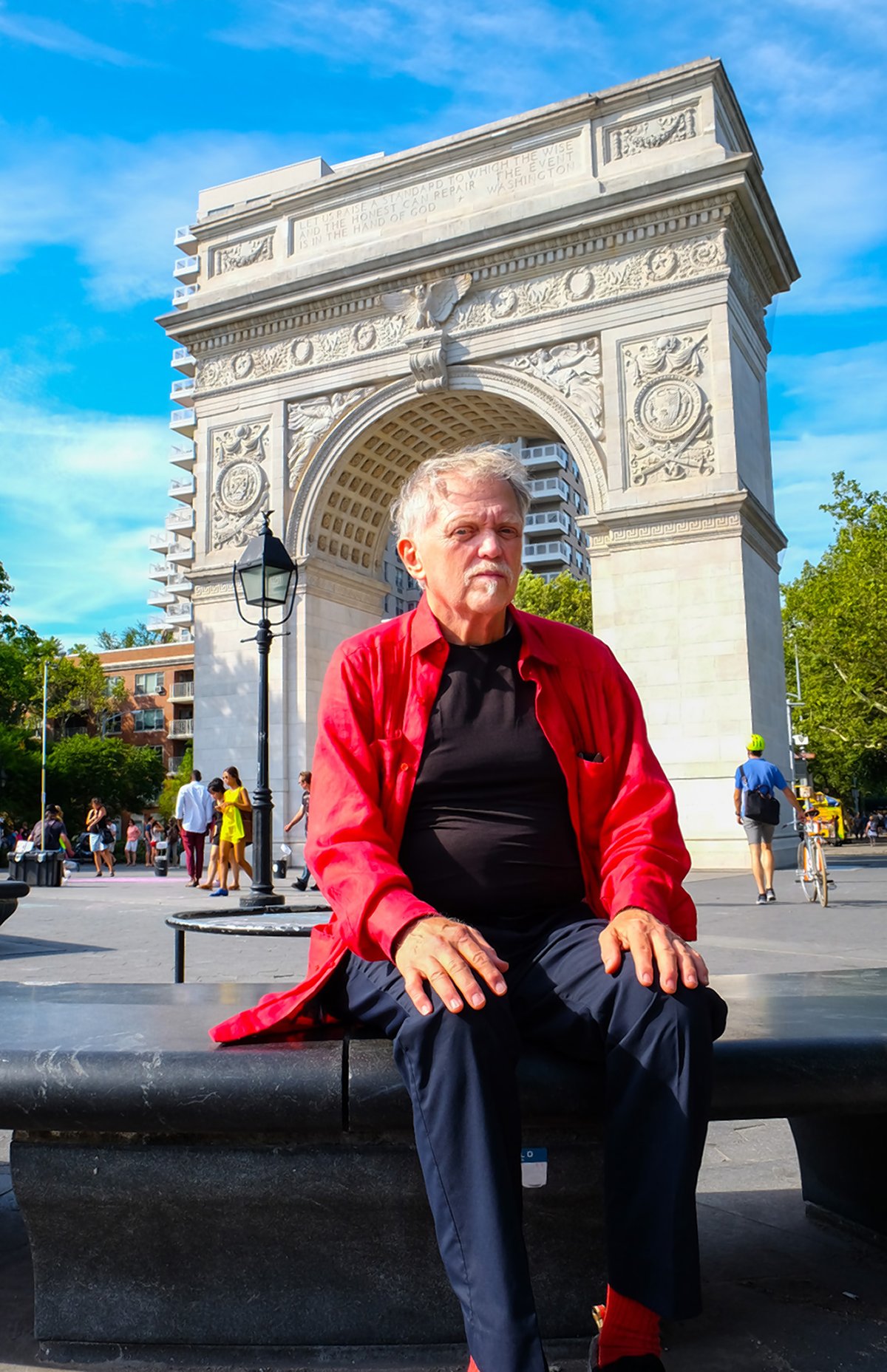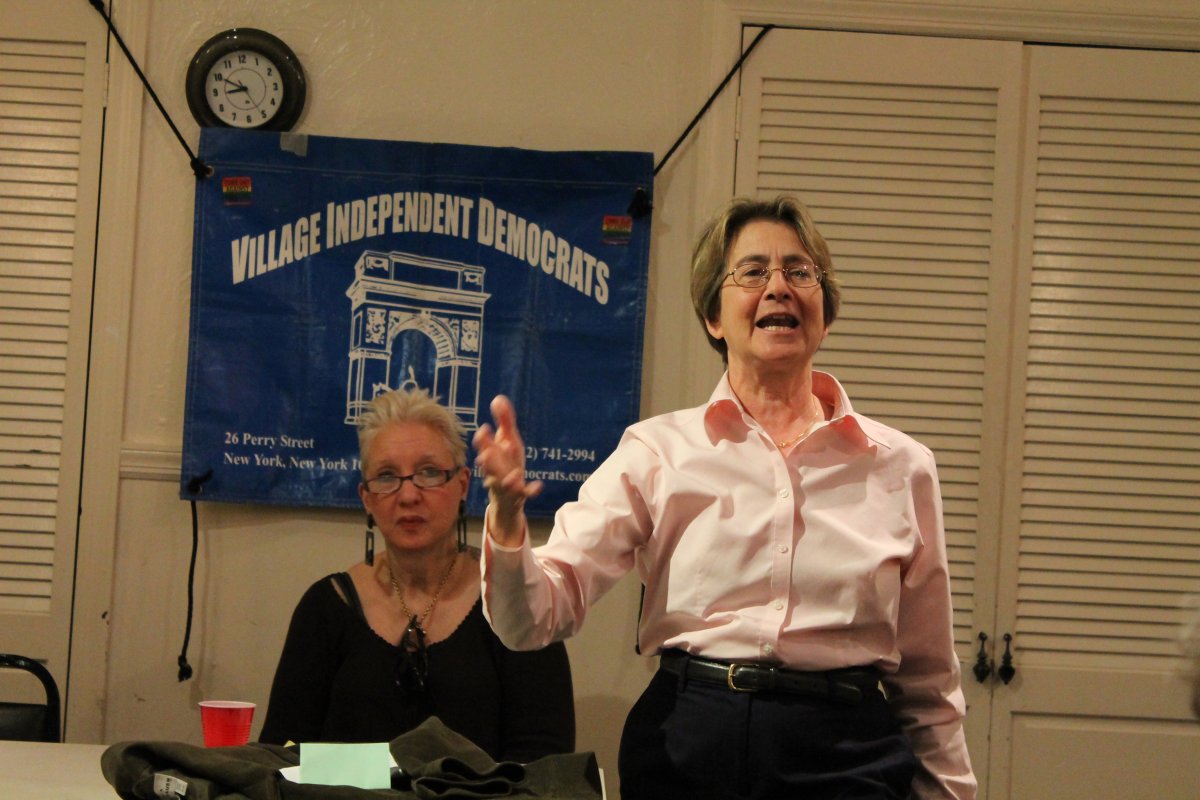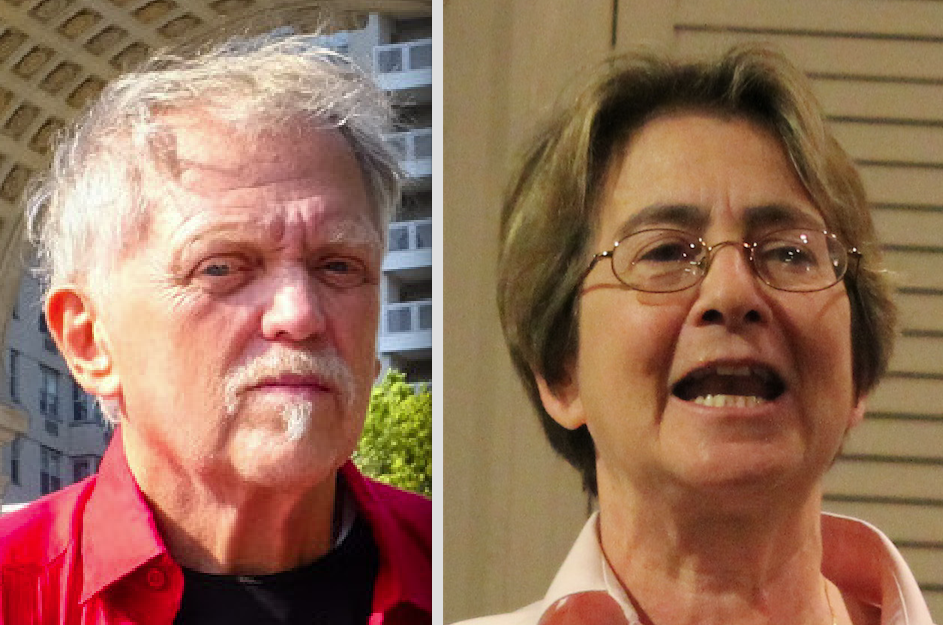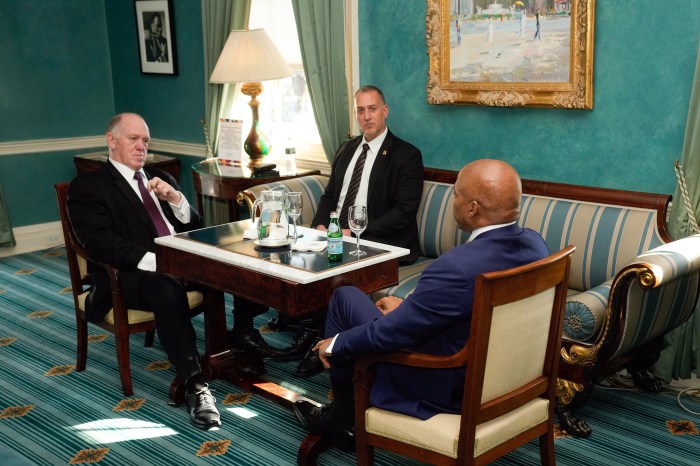
BY LINCOLN ANDERSON | The upcoming Sept. 13 Democratic primary election for the 66th Assembly District is something new for both of the candidates.
For veteran Assemblyember Deborah Glick, who is now in her 13th term in office, it will be her first Democratic primary challenge in her 26 years in Albany.
For her challenger, Village activist Jim Fouratt — who was at the Stonewall uprising of 1969 — it will be his first time on the ballot for a major political office.
The 66th District covers a broad swath of Downtown and Lower Manhattan, including Greenwich Village, Union Square, part of Gramercy, the East Village over to First Ave., Soho and Noho, Little Italy and Nolita, Hudson Square, Tribeca, the City Hall area and part of Battery Park City.
Glick is confidently running on her record, which she says is strong and explains why she has never faced a primary challenge before. Many consider her an “icon” in the L.G.B.T. community, since she was the first openly gay person elected to political office in New York City, and among the first in New York State.
“I believe 95 percent of any incumbent’s election is doing their job,” she said in an interview last week with The Villager. “You work hard, you respond to community needs, and you provide a rationale if people raise a concern about a bill or position. I work very hard.”
She said one reason she knows she has strong support in the district, is that every two years she needs to collect petition signatures to get on the ballot for re-election, and constituents unfailingly tell her she’s doing a good job.
“The response is always very strong,” she said, “because people know me and I am very responsive.”
Glick is game
Although the idea of facing a primary is new to her — not to mention the fact that it means extra work — she said she welcomes the challenge and finds it energizing. Plus, again, it has given her the opportunity to be on the streets and directly connect with constituents and hear about their concerns and issues, she said.
“I actually like campaigning,” she said.
Two years ago, Glick did face a challenge in the general election by Alexander Meadows running as a third-party candidate on his own ad hoc Progressive Party line. But she trounced him, coasting to re-election with 79.7 percent of the vote to Meadows’s 7.4 percent, while Republican candidate Nekeshia Woods garnered 12.8 percent.

Nevertheless, Fouratt, who is also openly gay, charges that Glick has been “silent” on important issues — from Albany corruption to the closing of St. Vincent’s Hospital — and that it’s time for a change.
Backs onto ballot
First, though, speaking of petition signatures, it bears mentioning that Fouratt did not get on the ballot in the usual manner. District Leader Arthur Schwartz, in fact, had been running against Glick and performed the necessary petitioning, gathering about five times the required 500 names. Fouratt, according to Schwartz, had been planning to run as an independent, meaning Fouratt would have had to gather 1,000 names. Either way, it’s no easy task to garner the required number of valid signatures of registered Democrats who live in the district.
Shortly after the petitioning period ended, however, about a month ago, Schwartz abruptly pulled out of the race, citing health concerns. Ten years ago, he had quadruple heart bypass surgery and five stents put in. His father died of a massive coronary at age 58, and Schwartz felt that the pressure of the primary race was, in turn, raising his blood pressure.
People who have had heart operations are generally very sensitive to their hearts, he said, adding it may have something to do with how nerves around the muscle are impacted by the surgery. In short, Schwartz told The Villager, this was no ploy from the get-go to pull a bait-and-switch and put Fouratt on the ballot on his part, but a genuine health issue that arose during the campaign.
Schwartz is also a top union lawyer and principal of the law firm Advocates for Justice, plus was Bernie Sanders’s New York State campaign counsel. He realized he simply had bitten off more than he could chew and had to drop out of the race.
Committee picks Fouratt
Each candidate creates what is known as a committee on vacancies when they are running, and this body appoints a replacement candidate in case the original candidate is incapacitated and can no longer run. Schwartz’s committee on vacancies included his wife; along with Ray Cline, a longtime power in the Village Reform Democratic Club; his son Jacob Schwartz, who is president of the Manhattan Young Democrats; Harvey Epstein, a leader of Coalition for a District Alternative, the East Village’s leading political organization and a director at the Urban Justice Center; and Marty Tessler, a former member of Community Board 2.
At any rate, Fouratt will be on the ballot next month, and he is raring to give Glick a run.
“I feel I can win,” he said.
Glick declines debate
He badly wants to debate Glick, but she is declining — citing the fact that it was Schwartz who did all the petition gathering, not Fouratt. In other words, Fouratt has not shown he has any backing in the community, she charged.
“He never collected a single signature,” she said. “Jim Fouratt has not demonstrated any public support.”
She also declined to debate Meadows two years ago, citing a snafu with his filing of his campaign financing.
Glick was recently endorsed for re-election by four of the Downtown area’s leading politicians, state Senators Brad Hoylman and Daniel Squadron and City Councilmembers Corey Johnson and Rosie Mendez. And she is supported by the area’s leading Democratic political clubs.
Fouratt — who shrugged that that kind of support is to be expected for an elected official — does not have any endorsements that he has made public yet. But he said he will roll out some high-profile names of his supporters from the arts community soon. He was miffed that Allen Roskoff’s Jim Owles Liberal Democratic Club, which had supported Schwartz, is now backing Glick.
“We’re very happy to be endorsing Deborah Glick,” Roskoff said. “Please! I mean is anyone endorsing Fouratt? I’d be shocked if it’s anyone of any credibility.”
Will pull an ‘Eastwood’
For his part, Fouratt said that as a progressive Democrat, Glick should welcome a debate with him, and that voters deserve to hear her speak publicly about the issues, and for her to be challenged. If Glick refuses to debate, he declared, he’ll hold a forum and “put a chair on a table” to represent Glick, and speak about his positions and her record.
That might bring to mind actor Clint Eastwood’s widely mocked stunt when he chided a chair representing President Obama at the Republican National Convention four years ago. But while Fouratt is, in fact, an actor, too — among his other hats — he is serious that he feels Glick’s record should be challenged, in a debate and in general.
Another way he hopes to get out his message is through a mailing — though, at $20,000, that will be an expensive proposition. Fouratt has not fundraised anywhere near the amount that Glick has, so it will be a challenge. Glick plans to do at least one district-wide mailing. Before he dropped out, Schwartz had already done one mailer, a piece featuring him and Sanders that he sent out before the New York presidential primary.
Glick, a Queens native, has lived in the Village for 40 years. She won her seat in a five-way primary in 1990 that included the likes of then-District Leaders Kathryn Freed, Tony Hoffmann and Liz Shollenberger. Besides Glick, there was one other gay candidate in the race, but unlike Glick, he wasn’t particularly open about it.
Who is Jim Fouratt?
Most voters likely know much less about Fouratt than Glick. He grew up in a working-class family in Rhode Island. He had initially hoped to become a Catholic priest and was studying at a seminary, but said that when he openly admitted to being gay, he was promptly told to leave. He came straight to New York and got involved in running large dance clubs, including Hurrah — “it was the beautiful people club,” he noted — Danceteria and the Peppermint Lounge on W. 42nd St., and also went into acting. In the 1980s, he was involved with ACT UP in direct-action protests to end the AIDS crisis. He currently writes a movie-review column.
On the political front, for the past 30 years, off and on, he has been a member of the Village Independent Democrats, which is Glick’s home club and her local power base.
Glick is 65 and Fouratt is 75.
“Age will not be an issue in this race,” Fouratt quipped. However, he added, “I’m not your typical 75-year-old.” He’s an avid Citi Bike rider, among other things.
Battling eviction
He’s currently fighting an eviction effort against him, which he said stemmed from an incident where his sink overflowed once. Councilmember Corey Johnson helped get him a pro bono attorney to fight his landlord. Eventually, Fouratt would like to move into a building with an elevator, so that he’s no longer living atop a fifth-floor walk-up.
But for now, he’s not moving — especially not out of the Assembly district, as that would make him ineligible to run.
He and Glick live about two blocks away from one another in the Village and frequently pass each other in the street.
Glick supports Hillary Clinton for president. Fouratt backed Sanders until he lost the nomination, then switched to Clinton, fearing Donald Trump’s impact on the U.S. Supreme Court.
Dismissed as a gadfly?
Some, however, see Fouratt as basically a political gadfly, someone who often attacks those in power, whoever they may be. Asking not to have his name printed for fear of mixing it up with Fouratt, one prominent local gay activist went so far as to call him “dangerous.” Another, again requesting anonymity, accused Fouratt of having a “highly toxic reputation in the gay community.”
Everyone, however, unfailingly acknowledges that Fouratt is “very smart.”
Fouratt says that his outspokenness and refusal to compromise on issues is, in fact, just what’s needed in Albany.
Tony Hoffmann, a past president of V.I.D., didn’t hold back in his assessment of Fouratt, branding him “very disruptive.”
“He’s very articulate, but he doesn’t follow through,” Hoffman said. “And he’s very disruptive. He brings organizations to a standstill.
“I’m a big fan of Deborah,” Hoffmann said. “She’s a major asset to this community, and I’d hate to lose her. We got a new school,” he said, referring to the 75 Morton St. middle school, “and she’s the one who found the location for it. I think she’s a big champion of the waterfront. She’s a leader on gay and lesbian issues. There’s no reason to change horses at this point.”
His plan of attack
Fouratt intends to hammer Glick on the closing of St. Vincent’s Hospital and also the air-rights transfer legislation that allows developers to purchase unused air rights from Hudson River Park.
Glick basically told The Villager that, in the past, the best that the community could get when facing the latest overly large development project, is to get a few stories shaved of the top. The Hudson River Park air-rights legislation, on the other hand, will provide a stream of revenue to the park that will allow the repair of Pier 40 — the Village’s beloved youth sports pier — among other things, she said.
“Pier 40 is important,” she said. “It’s important to the kids. It’s important to their parents. It’s important to schools in the areas and corporate teams who use it. It’s a vitally important recreational facility in an area — Community Boards 2 and 4 — that has the least amount of park space in the city.”
Glick is still vulnerable to the charge, though, that the air-rights bill was “stealth legislation,” passed at the end of session in Albany with no notification to constituents.
Fouratt, who proudly admits to a strong arts bias, said he actually had liked the glitzy Cirque du Soleil plan previously proposed by Related Companies for Pier 40 some years back that was derided by many as “Vegas on the Hudson.” He said he supported including in that plan a community meeting space on Pier 40 for the gay youth group FIERCE. Also on the arts, Fouratt said he fully supports the IFC Center movie theater expansion on Sixth Ave. at W. Third St., including building an extension on its vacant lot on Cornelia St.
“I had a boyfriend who used to park on that lot,” he recalled. The block isn’t solely residential, he noted, sporting a number of commercial storefronts, mainly restaurants.
The St. Vincent’s issue
As for St. Vincent’s, Glick maintained that she did clearly stake out her position early on that the hospital should be preserved, or at least taken over by another hospital group, such as Mt. Sinai, which had expressed interest in doing so. As for why the Mt. Sinai takeover plan ultimately failed, she stated she does not know the definitive reason. Back in 2010, when St. Vincent’s closed, a local healthcare administrator very close to the issue told The Villager that he knew for a fact that the commissioner of the state Department of Health had put the kibosh on the plan, declaring that another hospital group should not take over St. Vincent’s. The commissioner died soon after St. Vincent’s went under, so he can’t be grilled about allegedly letting the hospital die, Glick noted.
That said, Glick stressed that she did work in Albany to ensure that emergency funding was allocated to keep St. Vincent’s on life support toward the end, before it finally suddenly closed. It’s simply a fact that healthcare is increasingly moving toward an ambulatory model, she stated.
“Increasingly, you do not want to be in a hospital,” she said, noting that the highest number of “medical mistakes” happen in hospitals. “I do feel that people who think that a full-scale hospital is coming back aren’t facing the reality of healthcare,” she said.
Women’s safety
As for sexual harassment in the state Legislature, Glick noted that she has chaired the Assembly’s Interns Committee for about the last half-dozen years, so is charged with overseeing that interns are not harassed. It’s a responsibility she takes very seriously, she noted. She said that reforms were put in place following the Vito Lopez scandal, in which former Assembly Speaker Sheldon Silver was found to have authorized hush money payments to female interns Lopez had abused.
Sexual harassment complaints are now made to an outside firm and no longer are routed through the Speaker’s Office, she noted. These sort of reforms are constant and ongoing, she said.
In recent efforts, Glick said, she championed the passage of the state’s college campus sexual assault law, and — on other issues — has been working on increasing the number of red-light traffic cameras and also extending the hours of operation of speed cameras, the latter which are located outside schools.
‘Too loyal’ to Silver?
Regarding Silver, and the accusations that she was “too loyal” to him at the end, Glick said it was sad what happened to the former speaker, but that, at the same time, “he did a lot of good.” It was two schemes involving Silver’s outside work that led to his downfall, and this is an example, Glick said, of why she opposes legislators having outside income. In turn, she said, legislators — who only are in Albany half the year — need a pay raise, so that they can survive without outside income.
Two feisty, determined candidates
Although Fouratt does not lack for critics, Schwartz, for one, said he is exactly the kind of person needed to take on entrenched power.
“Jim has been an activist all of his adult life but with a difference: He is simply incapable of compromise and he owes nothing to anybody,” Schwartz said.
Glick, too, acknowledges that after her two-dozen-plus years in Albany, she also has her detractors in the community.
“I’m confident that I’m going to win,” she said. “There are going to be people, over time, who don’t like me for whatever reason — because I’m opinionated and I actually do tell people the truth. Not everyone wants to hear the truth.”






































